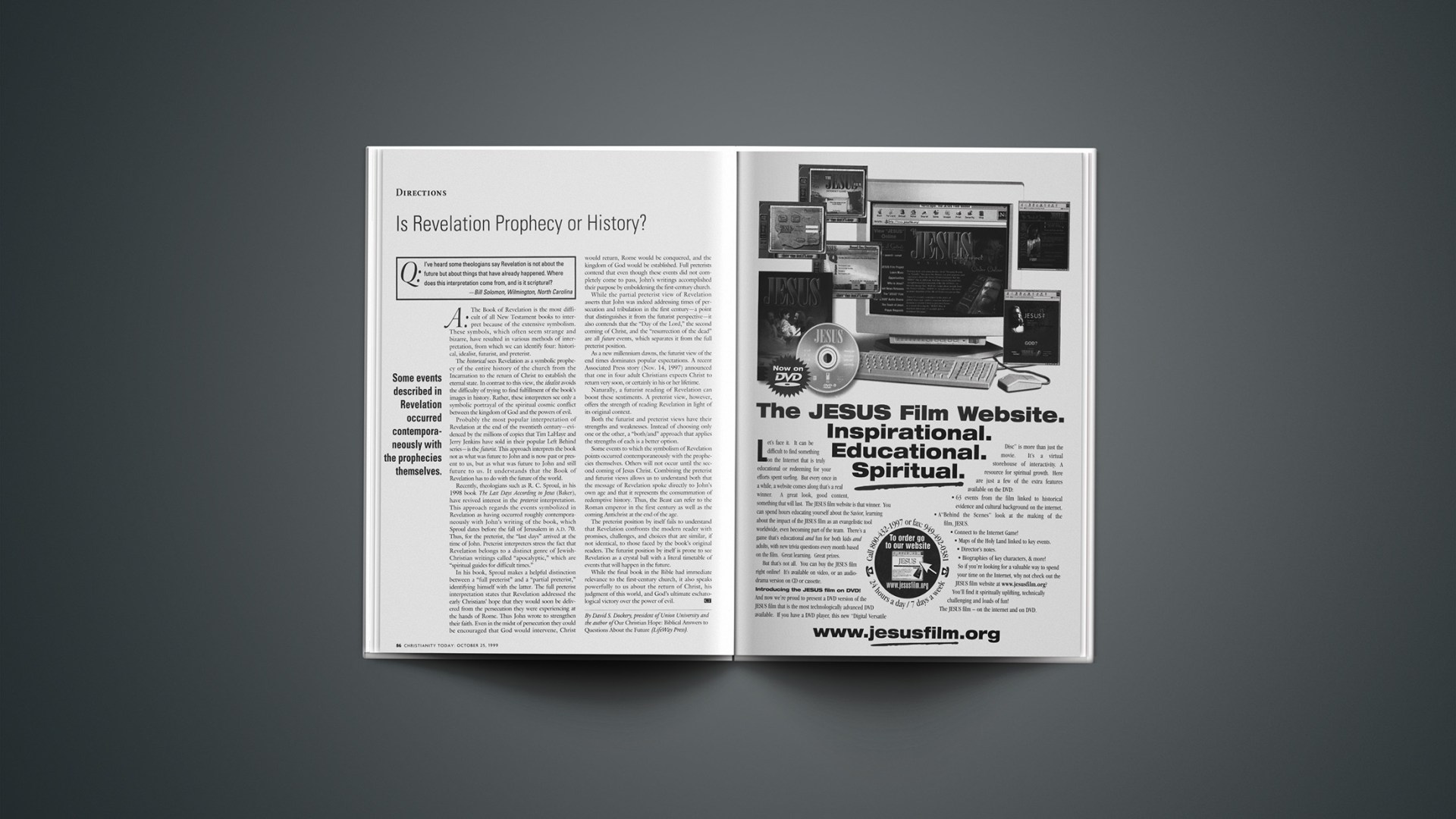| Q: | I’ve heard some theologians say Revelation is not about the future but about things that have already happened. Where does this interpretation come from, and is it scriptural?
—Bill Solomon, Wilmington, North Carolina |
A: The Book of Revelation is the most difficult of all New Testament books to interpret because of the extensive symbolism. These symbols, which often seem strange and bizarre, have resulted in various methods of interpretation, from which we can identify four: historical, idealist, futurist, and preterist.
The historical sees Revelation as a symbolic prophecy of the entire history of the church from the Incarnation to the return of Christ to establish the eternal state. In contrast to this view, the idealist avoids the difficulty of trying to find fulfillment of the book’s images in history. Rather, these interpreters see only a symbolic portrayal of the spiritual cosmic conflict between the kingdom of God and the powers of evil.
Probably the most popular interpretation of Revelation at the end of the twentieth century—evidenced by the millions of copies that Tim LaHaye and Jerry Jenkins have sold in their popular Left Behind series—is the futurist. This approach interprets the book not as what was future to John and is now past or present to us, but as what was future to John and still future to us. It understands that the Book of Revelation has to do with the future of the world.
Recently, theologians such as R. C. Sproul, in his 1998 book The Last Days According to Jesus (Baker), have revived interest in the preterist interpretation. This approach regards the events symbolized in Revelation as having occurred roughly contemporaneously with John’s writing of the book, which Sproul dates before the fall of Jerusalem in A.D. 70. Thus, for the preterist, the “last days” arrived at the time of John. Preterist interpreters stress the fact that Revelation belongs to a distinct genre of Jewish-Christian writings called “apocalyptic,” which are “spiritual guides for difficult times.”
In his book, Sproul makes a helpful distinction between a “full preterist” and a “partial preterist,” identifying himself with the latter. The full preterist interpretation states that Revelation addressed the early Christians’ hope that they would soon be delivered from the persecution they were experiencing at the hands of Rome. Thus John wrote to strengthen their faith. Even in the midst of persecution they could be encouraged that God would intervene, Christ would return, Rome would be conquered, and the kingdom of God would be established. Full preterists contend that even though these events did not completely come to pass, John’s writings accomplished their purpose by emboldening the first-century church.
While the partial preterist view of Revelation asserts that John was indeed addressing times of persecution and tribulation in the first century—a point that distinguishes it from the futurist perspective—it also contends that the “Day of the Lord,” the second coming of Christ, and the “resurrection of the dead” are all future events, which separates it from the full preterist position.
As a new millennium dawns, the futurist view of the end times dominates popular expectations. A recent Associated Press story (Nov. 14, 1997) announced that one in four adult Christians expects Christ to return very soon, or certainly in his or her lifetime.
Naturally, a futurist reading of Revelation can boost these sentiments. A preterist view, however, offers the strength of reading Revelation in light of its original context.
Both the futurist and preterist views have their strengths and weaknesses. Instead of choosing only one or the other, a “both/and” approach that applies the strengths of each is a better option.
Some events to which the symbolism of Revelation points occurred contemporaneously with the prophecies themselves. Others will not occur until the second coming of Jesus Christ. Combining the preterist and futurist views allows us to understand both that the message of Revelation spoke directly to John’s own age and that it represents the consummation of redemptive history. Thus, the Beast can refer to the Roman emperor in the first century as well as the coming Antichrist at the end of the age.
The preterist position by itself fails to understand that Revelation confronts the modern reader with promises, challenges, and choices that are similar, if not identical, to those faced by the book’s original readers. The futurist position by itself is prone to see Revelation as a crystal ball with a literal timetable of events that will happen in the future.
While the final book in the Bible had immediate relevance to the first-century church, it also speaks powerfully to us about the return of Christ, his judgment of this world, and God’s ultimate eschatological victory over the power of evil.
Read more about these related topics:
—End Times
—Apocalypse
—Y2K
—Christian Fiction
Copyright © 1999 Christianity Today. Click for reprint information.










